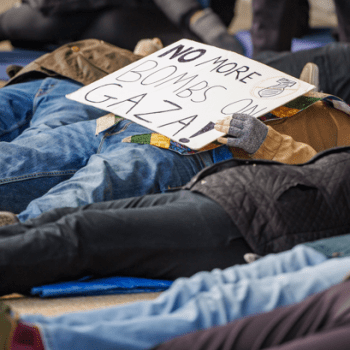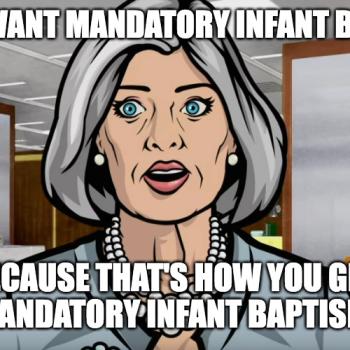From a legal point of view, “civil unions” just don’t cut it.
To see why, just consider why the idea of civil unions as a separate-but-equal marriage-like thing for same-sex couples seems initially appealing for some folks. Anyone who views civil unions favorably arrives at that point because they’ve recognized that there’s an injustice — an inequality under the law — that needs to be corrected. They’ve recognized that it’s fundamentally unfair for opposite-sex couples to have access to more than a thousand legal benefits that come with getting married while same-sex couples are barred from access to such benefits.
That’s wrong, and those who advocate for civil unions see that it’s wrong.
So far so good. Recognizing an injustice and wanting to correct it is a Good Thing. But proponents of civil unions balk at the obvious next step. If you’re upset by inequality, the simplest solution is to establish equality. Civil unions are an attempt to get that result without quite actually doing that. They are an attempt to allow same-sex couples access to all the legal benefits of marriage except that of being legally married — an attempt to grant legal equality while still denying social equality.
And like all separate-but-equal schemes, that can’t work. All such schemes rely on mechanisms to enforce and perpetuate separateness, and all such mechanisms deny the possibility of real equality.
That’s why civil unions, here in the U.S., can’t be squared with the Constitution and its guarantees of equal protection under the law. As Supreme Court Justice Ruth Bader Ginsburg said, the Constitution doesn’t allow us to grant one set of citizens marriage while offering others only “skim-milk marriage.”
For all of that, though, this is still a big deal: “Pope Francis: Church could support civil unions.”
Pope Francis reaffirmed the Catholic Church’s opposition to gay marriage on Wednesday, but suggested in a newspaper interview that it could support some types of civil unions.
The Pope reiterated the church’s longstanding teaching that “marriage is between a man and a woman.” However, he said, “We have to look at different cases and evaluate them in their variety.”
States, for instance, justify civil unions as a way to provide economic security to cohabitating couples, the Pope said in a wide-ranging interview published Wednesday in Corriere della Sera, an Italian daily. State-sanctioned unions are thus driven by the need to ensure rights like access to health care, Francis added.
A number of Catholic bishops have supported civil unions for same-sex couples, including Pope Francis when he was Archbishop of Buenos Aires in 2010, according to reports in National Catholic Reporter and The New York Times.
But Wednesday’s comments are “the first time a Pope has indicated even tentative acceptance of civil unions,” according to Catholic News Service.
Roman Catholic thinking on the relationship between church and state is … complicated. John Courtney Murray is still dead and in many ways it seems his ideas about how the Catholic church should behave in pluralistic societies under secular government were buried with him. But Murray’s theology suggests that Francis’ “tentative acceptance of civil unions” is a positive step for the church.

Again, civil unions just don’t cut it legally. Separate-but-equal cannot be squared with the legal system of any country whose constitution guarantees equal protection under the law. So it would be inadequate and wrong — both unjust and illogical — for the pope and his church to advocate civil unions as a legal reality in America or in any other country. Marriage equality — the full and equal legal recognition of same-sex marriage — is the only just aim, and the church should never stand opposed to justice.
But for the church itself, and for how it regards legally married same-sex couples, I think the framework of civil unions can be helpful.
This is, after all, how the church already regards most legally recognized marriages — including most “traditional” legal marriages between opposite-sex couples.
My marriage, for example, is really only a “civil union” in the eyes of the Roman Catholic Church. My wife was previously married in the Catholic church. That marriage ended in divorce (just as my previous marriage did — although the Catholic church doesn’t care about that one so much because my first wife was Protestant). But the Roman Catholic Church does not recognize divorce. In its eyes, my wife’s first marriage wasn’t just a legal covenant, but a “sacramental, indissoluble union … established by God” and “it is impossible for any human power to break the God-made bond, or sacramental covenant, between husband and wife. ”
And thus, since the Catholic church can never recognize that divorce, it also does not recognize my wife’s current marriage — to me — as legitimate or real.
But note the important thing here: Despite this firm commitment to its doctrine of marriage, the Roman Catholic Church is not attempting to bar Catholics from access to legal divorce. It is not lobbying to make it illegal under secular law for anyone to obtain a civil divorce. Nor is it attempting to prevent divorced people from access to legal, civil remarriage. Divorce and remarriage are, in the eyes of the Catholic church, sins. But the church acknowledges that they are also a legal right that it would be unjust and immoral (i.e., sinful) to deny others.
There’s no reason — no Catholic reason — that Pope Francis and his church could not take the same approach to same-sex marriage.
A further point on this: Official Catholic doctrine says that my marriage is actually the sin of adultery. My wife, the church says, is thus an adulteress living in sin, and must therefore be denied the sacraments. That’s not merely false and unjust, it’s rude — which is why I think it was utterly appropriate for the ‘vixen to respond with a hearty “Same to you, buddy”* and never look back.
Yet for all this sacrament-denying, soul-damning-for-eternity condemnation, the Catholic church is also able, however grudgingly, to admit that my marriage is a Good Thing. Without compromising its condemnation of our shameful wickedness and adultery, the church also acknowledges that, granted that regrettable context, it’s nice to see a couple of wicked adulterers settling down together and getting along so well. There’s a sense in which the church is even able, somewhat haltingly, to be happy for us. It’s able on some level to recognize that there are a lot of wicked adulterers and other “intrinsically disordered” people in this world and that, all else being equal, if some of those adulterers or intrinsically disordered people find love and make lifelong commitments to one another then, well, that’s something that deserves to be celebrated.
There’s a sense, in other words, in which the Catholic church regards my marriage as no different from any other marriage that occurs outside that church. A couple of lifelong atheists are legally wedded by a justice of the peace in a courthouse? That is, in the eyes of the church, not the same as a sacramental, indissoluble union established by God and overseen by a priest. It’s not what the Catholic church thinks of as a marriage, merely a “civil union.” But it’s still nice, isn’t it? It’s good for them and good for the whole community. Sure, yes, they’re hell-bound sinners, but we can still honor the commitment they’ve made to one another and smile as we wish them a happy anniversary every year.
There’s no reason the Catholic church cannot take that exact same position toward legal marriage equality for same-sex couples.
That is, in fact, the most just course of action for this pope and this church. That is what the Roman Catholic Church ought to do if it is to be faithful to its own teaching. It needs to get out of the way of legal equality and abandon all opposition to the full legal recognition of secular same-sex marriage just exactly as it has done with the full legal recognition of secular opposite-sex divorce and remarriage.
I think it should also reconsider and reform its teaching on the ecclesiastical and sacramental validity of same-sex marriages and opposite-sex remarriages, but that’s a separate matter. That step would involve a change in Catholic theology, and Catholic theology is their business. It’s their prerogative to work out their business on their own. If they want to continue denying the sacraments to Catholics who are divorced and remarried or to Catholics in same-sex marriages, that’s a mistake and an injustice (a harmful, hurtful sin) that the Catholic church is free to continue. Within their own church, they have every right to keep being utterly and perversely and cruelly wrong in that way.
But the Catholic church’s legal opposition to legal marriage equality is not occurring within their own church. This is an injustice the church is committing outside of its own jurisdiction. That’s wrong. And it’s wrong according to Catholic principles and Catholic teaching.
There’s no good Catholic reason for them to be fighting against the secular, legal right of same-sex couples to get married. That is a mistake and a sin and an error and an injustice that Francis and his church have no business continuing.
They need to, in a word, repent.
– – – – – – – – – – – –
* Not her actual words, but this is a family friendly blog.
















